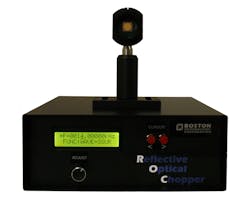The Reflective Optical Chopper offers greater frequency range and a faster chopping speed than a traditional optical chopper without the need to alter the beam size. It can function continuously from sub-hertz speeds up to 100 kHz. Users can chop the beam with an arbitrary pattern by providing an input signal.
Boston Micromachines
Cambridge, MA
www.bostonmicromachines.com
More Products
-----
PRESS RELEASE
Boston Micromachines Introduces High Performance Reflective Optical Chopper for Laser Science Applications
New Optical Chopper Boasts High Speed, Versatility and Ease of Use
Boston Micromachines Corporation (BMC), a leading provider of MEMS-based deformable mirror (DM) products and adaptive optics systems, introduced the Reflective Optical Chopper (ROC). Designed to out-perform the traditional optical chopper, the ROC offers greater frequency range and a faster chopping speed without the need to alter the beam size.
Unlike traditional solutions which require the use of separate chopper wheels at different ranges of frequencies, the ROC can function continuously from sub-Hertz speeds up to 100kHz. Even more, the versatile optical chopper does not require reduction of the size of the beam at higher speeds. As an added feature, scientists can chop the beam with an arbitrary pattern simply by providing an input signal.
"Signal-to-noise ratio (SNR) improvement is important to many laser science applications," said Paul Bierden, president and CEO of Boston Micromachines. "Our high speed, large aperture ROC meets the demands of improving SNR."
The ROC works as a reflective diffraction grating, chopping the beam by varying between an unpowered flat mirror-state and a powered diffractive state. With a module that easily fits into a standard 1â optical mount, the ROC is operable within minutes of unpacking. The ROC can be operated either in standard mode with the on-board signal generator, or in custom mode using a user-generated 5-volt TTL signal.
Priced at $1,700 the ROC is currently available.
About Boston Micromachines Corporation
Founded in 1999, Boston Micromachines Corporation (BMC) is a leading provider of advanced microelectromechanical systems (MEMS) based mirror products and adaptive optics systems. By applying wavefront correction to produce high resolution images, BMC devices can be used for imaging biological tissue and the human retina and to enhance images blurred by the earth's atmosphere. The company's suite of award-winning compact deformable mirror (DM) products is the most cost-effective, highest performance mirrors in the market today. They are widely used to drive scientific discovery in astronomy, laser beam shaping, microscopy, vision science, and support a variety of defense applications. Customers include NASA, UC Berkeley, Oxford University, Lockheed Martin and Boston University. Located in Cambridge, MA, BMC is privately held and offers custom-designed manufacturing services in addition to its portfolio of standard DM products. For more information on BMC, please visit www.bostonmicromachines.com.
-----
Follow us on Twitter
Subscribe now to Laser Focus World magazine; it's free!
